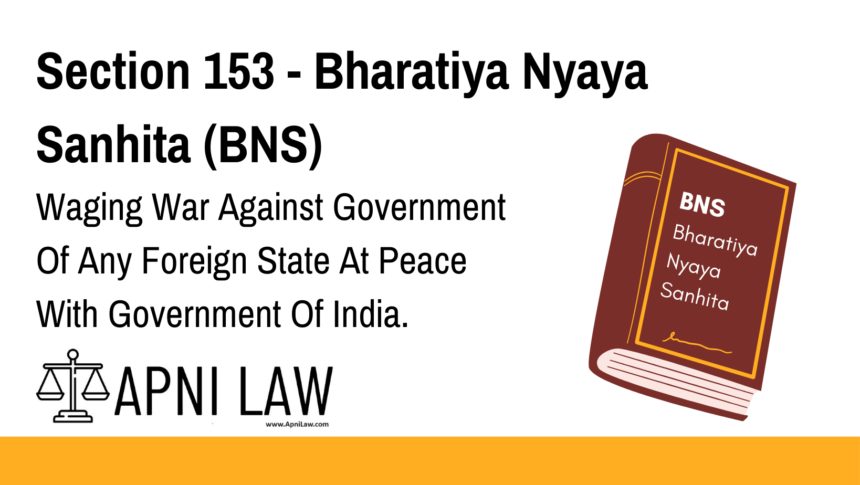Government
Code – Section 153 BNS
Whoever wages war against the Government of any foreign State at peace with
the Government of India or attempts to wage such war, or abets the waging of such war, shall
be punished with imprisonment for life, to which fine may be added, or with imprisonment of
either description for a term which may extend to seven years, to which fine may be added, or
with fine.
Explanation of Section 153 BNS
Section 153 of the Bharatiya Nyaya Sanhita, 2023 (BNS) aims to prevent acts of war against foreign states that have peaceful diplomatic relations with India. This section ensures that individuals do not jeopardize India’s foreign policy and international relations through unauthorized acts of aggression.
Key Elements of Section 153 BNS
-
Offense of Waging War:
-
Waging war against a peaceful foreign state.
-
Attempting to wage war.
-
Abetting (supporting, financing, or assisting) such war.
-
-
Peaceful Foreign State:
-
The law only applies if the foreign state is at peace with India.
-
Actions against hostile or enemy states are governed by different laws.
-
-
Punishment:
-
Imprisonment for life, with a fine.
-
Imprisonment up to seven years, with a fine.
-
Fine (in lesser cases).
-
Illustrations of Section 153 BNS
Example 1: Mercenary Fighting Against a Friendly Country
An Indian citizen joins a militant group to fight against a government that has friendly relations with India. This act is punishable under Section 153 BNS.
Example 2: Funding a Rebel Group Against a Foreign State
A person provides financial aid to a group planning to overthrow the government of a country at peace with India. This is considered abetting war and is punishable.
Example 3: Attempting to Incite War Against a Friendly Country
An individual publicly calls for armed rebellion against a peaceful foreign state and attempts to recruit fighters. This qualifies as attempting to wage war and is covered under Section 153 BNS.
Example 4: Diplomatic Protest (Not an Offense)
A person peacefully protests against a foreign government’s policies. Since there is no act of war or violence, this is not punishable under Section 153 BNS.
Common Questions and Answers on Section 153 BNS
1. Can an Indian citizen fight in a war for another country?
If India has friendly relations with that country’s enemy, participating in the war could violate Section 153 BNS. However, if legally enlisted in a recognized foreign army, it may not be an offense.
2. What is considered “abetting” under this section?
Abetting includes:
-
Providing financial or material support to armed groups.
-
Assisting in recruitment for a war effort.
-
Planning or aiding a conspiracy to attack a peaceful foreign state.
3. Does this law apply to cyber warfare?
Yes. If an individual hacks into government systems or conducts cyber-attacks against a friendly foreign state, it can be considered an act of war and fall under Section 153 BNS.
4. How is this different from treason or sedition?
-
Section 152 BNS – Deals with threats to India’s sovereignty.
-
Section 121 BNS – Covers waging war against India.
-
Section 153 BNS focuses on waging war against a foreign state that is at peace with India.
Conclusion
Section 153 BNS ensures that India’s international relations and diplomatic ties remain secure by preventing individuals from engaging in unauthorized acts of war against friendly nations.
For more legal insights, visit ApniLaw today! 🚀











